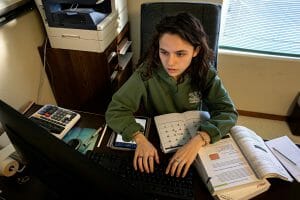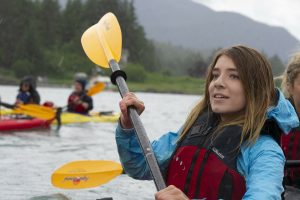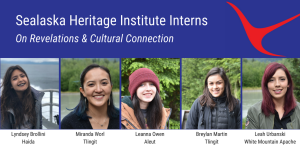New Sealaska-Codefy partnership creates impact, builds skills in tech for young shareholders

Taylor Natkong wanted to learn to code, but without having to leave her culture and homeland behind. Before participating in a new software programming opportunity made possible through Sealaska’s partnership with Codefy, she might have felt forced to choose. But now, she says, through this program, she has found the best of both worlds. Natkong, originally from Hydaburg, recently moved to Anchorage, juggling a full-time job while learning the language of programming.
 “I’d always thought that if I would have a set career with technology, then it would be one that would pull me out of Alaska and I haven’t really wanted to do that,” said Natkong. “I wanted to stay in my home state, have the ability to go back and visit home whenever I wanted. And this has given me the opportunity to visit and spend time there, while being able to learn more about something I’ve always been into.”
“I’d always thought that if I would have a set career with technology, then it would be one that would pull me out of Alaska and I haven’t really wanted to do that,” said Natkong. “I wanted to stay in my home state, have the ability to go back and visit home whenever I wanted. And this has given me the opportunity to visit and spend time there, while being able to learn more about something I’ve always been into.”
Sealaska sees the value in building a pathway for shareholders, especially those in rural communities, to high-paying remote opportunities like those available in the tech industry. Partnering with Codefy has allowed Sealaska’s Shareholder Development department to broaden its offerings, investing in career opportunities and workforce training for those whose current path does not include college.
With Codefy, young shareholders and descendants can forge a path in programming from their home community, or anywhere they choose, empowering more young people to stay in (or return to) Alaska while building high-demand skills and connecting with opportunities in the tech industry. Participants in the program receive industry-recognized credentials and learn programming with Java, Agile, Scrum, databases, and SQL. After completing the program, participants are eligible for an internship in a related sector of Sealaska’s businesses, allowing them to practice their new skills in a supportive workplace environment.
Natkong was part of the inaugural Sealaska Codefy cohort and completed her training in early May.
“I haven’t just gained coding skills from Codefy, but I also gained networking and interpersonal skills, resume building techniques, stuff like that,” she said. “Along with that, we also talked a lot about issues facing the world — not just the world at large but also our worlds, our own communities, and how we might be able to use what we’re learning to make change.”
That’s not a coincidence, says Codefy founder, teacher and lead mentor Sabina Rajasundaram. Critical thinking is built into the curriculum each cohort studies, as participants learn not just the hard skills of coding, but how to lean on their training to solve problems related to issues important to them, their loved ones and the places they call home.
“I started Codefy as a way of giving back to the community, making space for underrepresented communities in tech, especially Native American and Alaska Native voices,” Rajasundaram said. “Unless we have Indigenous voices in the tech community, there cannot be technology solutions that truly address the challenges facing Indigenous communities — these solutions can only really be developed by people who know the community inside and out.”
Building skills and confidence in coding is helping Natkong combine her passion for technology with a calling she’s always felt: giving back.
“I’ve always enjoyed computers and at the same time, I always wanted my career to be centered around helping people or changing lives,” she said. “But I had never really ever found a way to put the two together.”
By following up her formal Codefy training period with a skill-building internship in applications development with Sealaska’s Shareholder Relations team, though, she is learning a way to do both. The applications developed by the team, such as MySealaska, make a tangible difference in the way shareholders can engage with their corporations, creating greater accessibility for all shareholders.
 “Education and access are big barriers that I see, especially for remote communities,” shared Natkong. “I guess now, my ultimate goal is to hopefully build some kind of alternative education solution and get that out to remote communities like mine, so they aren’t limited by the teachers or education that they can bring in on site.”
“Education and access are big barriers that I see, especially for remote communities,” shared Natkong. “I guess now, my ultimate goal is to hopefully build some kind of alternative education solution and get that out to remote communities like mine, so they aren’t limited by the teachers or education that they can bring in on site.”
Fostering a strong sense of community is also part of what Codefy teaches, says Kayla Roberts, Sealaska’s Senior Manager of Shareholder Development.
“This program is self-paced and rigorous, but it really empowers participants like Taylor to just shine,” said Roberts. “The students are very supported, they build strong connections with their cohort and also with graduates who act as mentors and come back to share their experiences and build connections. It’s very nurturing while allowing them the freedom to look into different areas of the industry that they might want to pursue.”
By creating space for participants to explore the possibilities of programming from home, the program encourages young shareholders from diverse backgrounds to think local and dream big.
“When there’s a diversity of ideas and backgrounds and perspectives, then there are better ideas, creating better solutions for the tech industry,” Rajasundaram said. “And those solutions — coming from these students and others like them — help build a better world for us all.”
Recent graduates of the Sealaska-Codefy partnership are all currently participating in Sealaska’s summer internship program. Applications for the next Codefy cohort will open later this summer — look for updates on social media and in other communications in the coming months. Learn more about Sealaska’s partnership with the Codefy program here.










 Previous
Previous